
Finland - narrow gauge museum railways
For a full scale picture, please click on the picture shown !
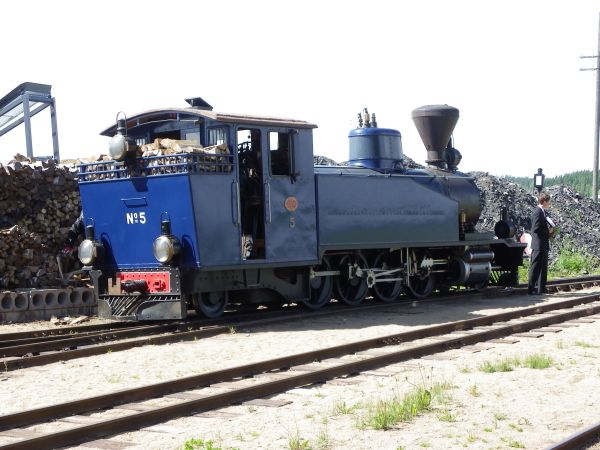
This category is for narrow gauge museum railways. The title picture on the
top is no. 5 of Hyvinkää-Karkkila railway, nicknamed "Sohvi". Sohvi was built in 1917 and it is the oldest locomotive built
in Finland since Finland became independent. Photo at Minkiö station 6.6.2010 by Ilkka Siissalo.
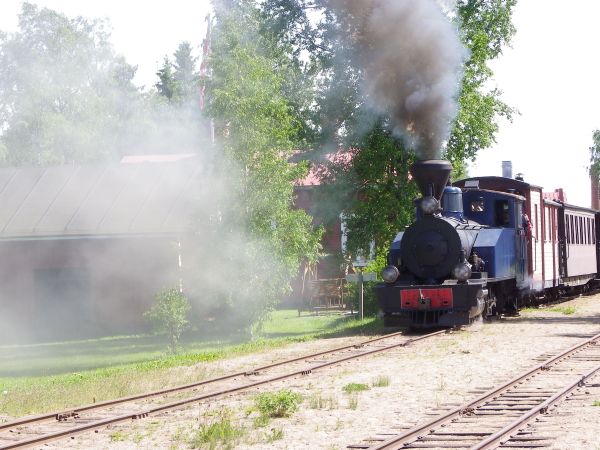
A museum train full of tourists led by the "Sohvi" no 5 engine leaving Minkiö station. Picture 6.6.2010 by Ilkka Siissalo.
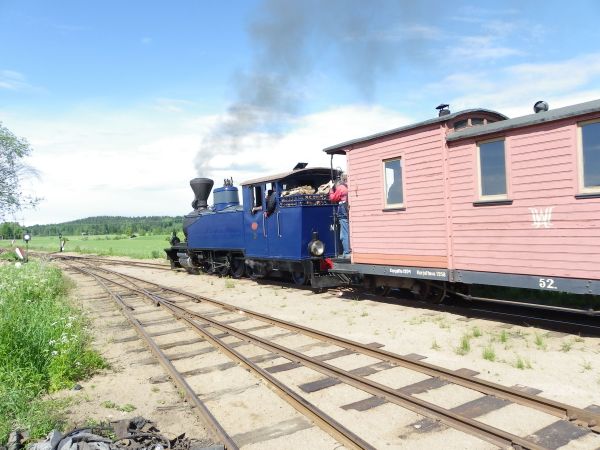
A museum train led by "Sohvi" no 5 engine leaving Minkiö station towards Humppila. Picture 6.6.2010 by Ilkka Siissalo.
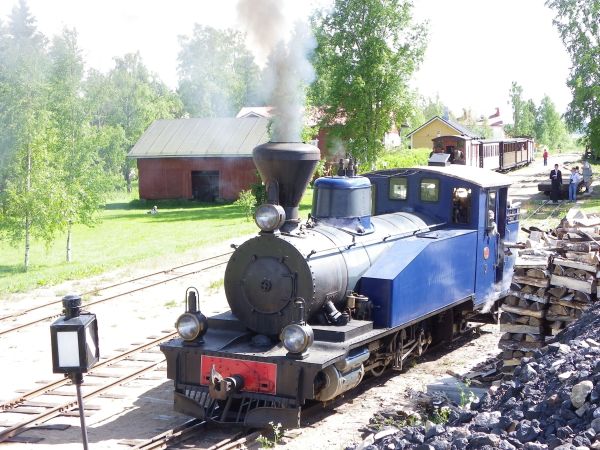
"Sohvi" no 5 loading wood. Picture 6.6.2010 by Ilkka Siissalo.
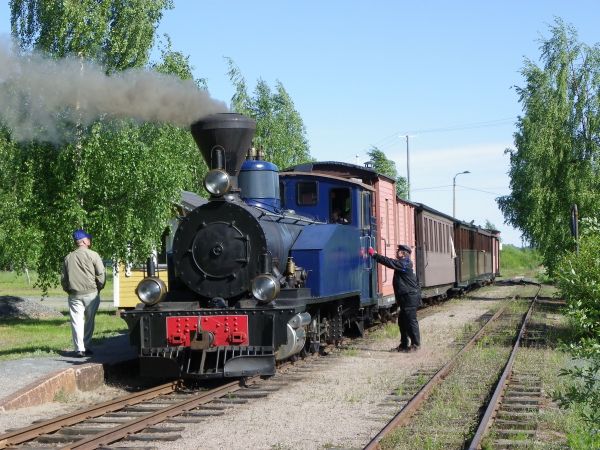
The same museum train as above, but now at Jokioinen station at the other end of the museum line, ready to leave towards
Minkiö and Humppila. Picture 6.6.2010 by Ilkka Siissalo.
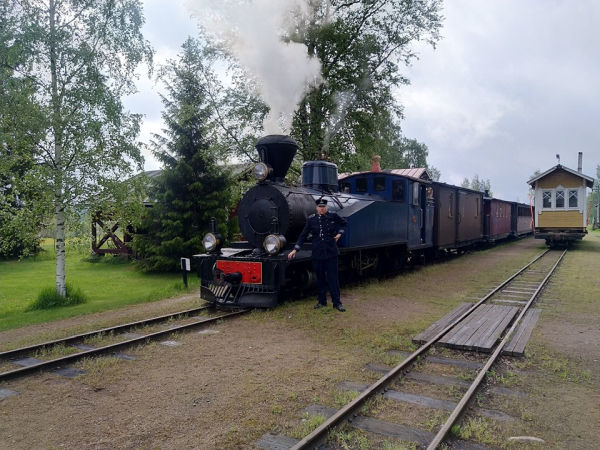
A chartered museum train at the Minkiö station. The locomotive is HKR5 (former Hyvinkää-Karkkila railway no.5) which was built
in December 1917. The wagon behind it is JR11 (brake wagon no.11) built by the Hietalahti shipyards in Helsinki in 1899. The third
coach is from the former Harviala forest railway built sometime in the beginning of the 1900s. And then there is a partly open
summer coach built by Orenstein & Koppel sometime in the 1920s.
Picture from Minkiö 25.5.2019 by Jyrki Längman.
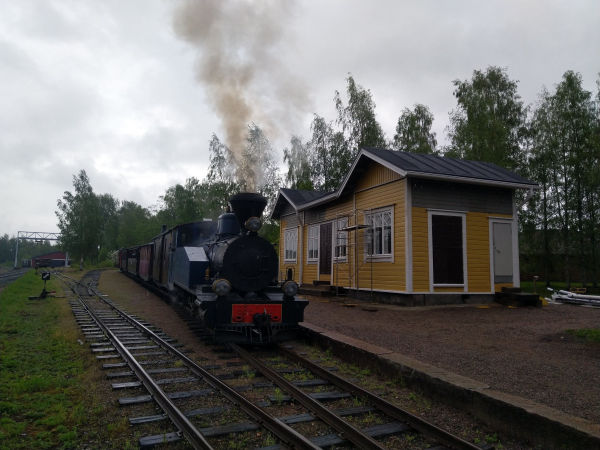
The same chartered museum train as above, here arriving at the station of Humppila. The village of Humppila got in 2019 a "new"
narrow gauge rail station. A small old station house, formerly the station of Riippa, was moved in December 2018 to Humppila,
where voluntary enthusiasts have been putting it into working order. In this picture the yellow new colour of the station house
is not yet quite ready.
Picture from Humppila 25.5.2019 by Jyrki Längman.
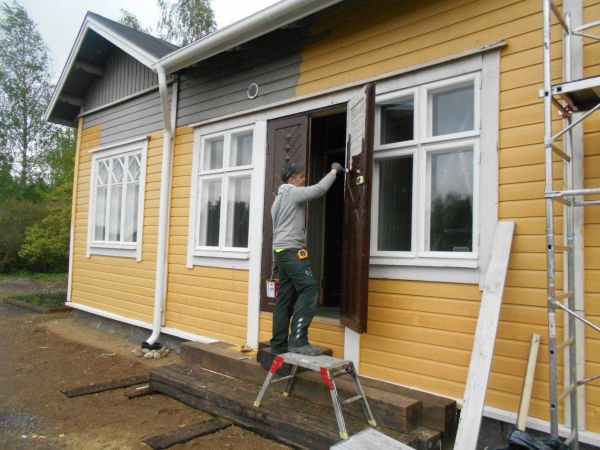
The former station house of Riippa, now in the village of Humppila by the Jokioinen-Humppila narrow gauge museum railway. Painting works
and other preparations are being made after moving the building such a long way.
Picture from Humppila 25.5.2019 by Jyrki Längman.
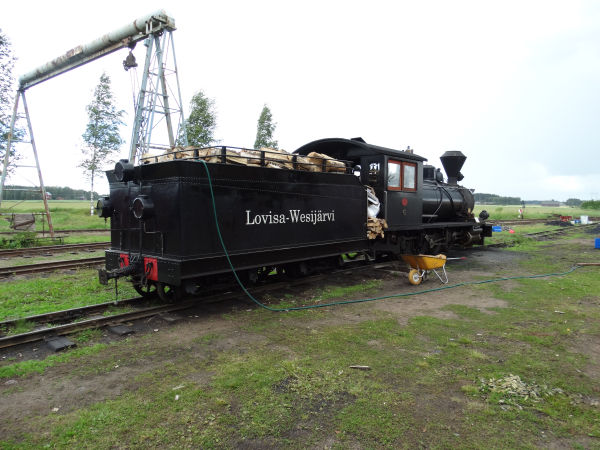
Refuelling and filling the water tank of the Jokioinen-Humppila museum railway locomotive no.6 "Helga", a former Loviisa-Vesijärvi
railway machine from 1909, where it was in use until 1960. Picture at Minkiö station 5.8.2017 by Ilkka Siissalo.
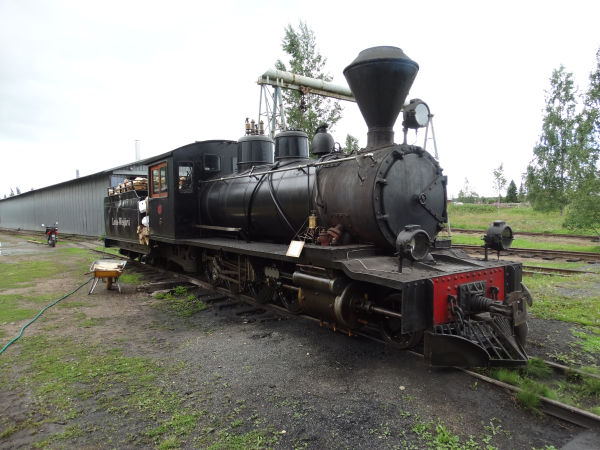
Locomotive no.6 "Helga" seen from the other direction. It was just being heated. Picture at Minkiö station 5.8.2017 by Ilkka Siissalo.
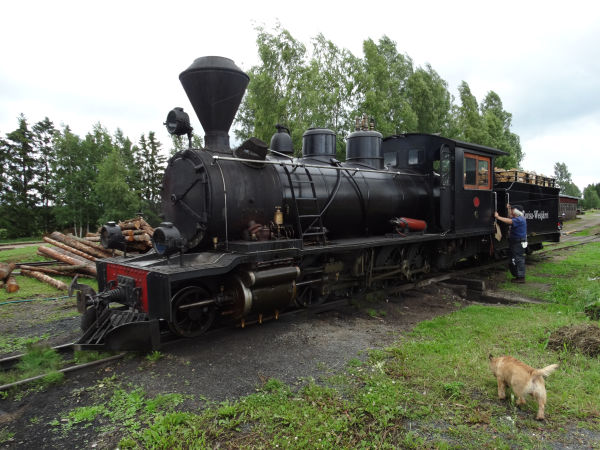
Locomotive no.6 "Helga" seen from yet another direction. The dog in the picture is our trainspottingcairnterrier Mei.
Picture at Minkiö station 5.8.2017 by Ilkka Siissalo.
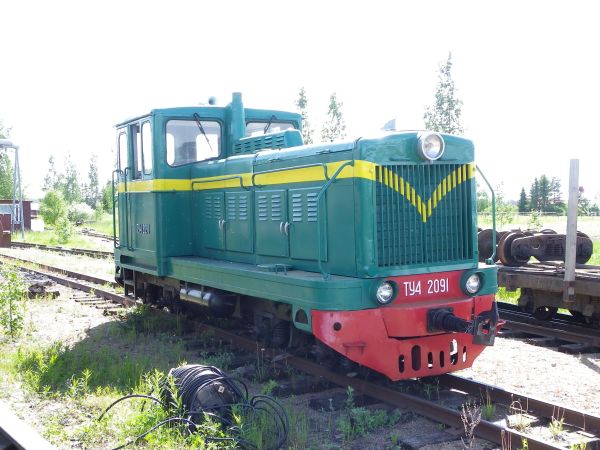
This is a Soviet Russian built TU-4 narrow gauge diesel, which the Jokioinen Museum Railway bought from the Baltics and restored
for track maintenance purposes. Photo at Minkiö station 6.6.2010 by Ilkka Siissalo
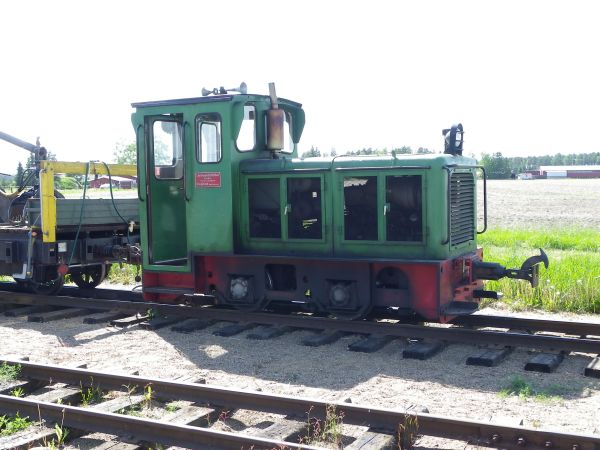
A German built Schöttler (later Schöma) small diesel at the Jokioinen Museum Railway. Picture at the Minkiö station 6.6.2010
by Ilkka Siissalo.
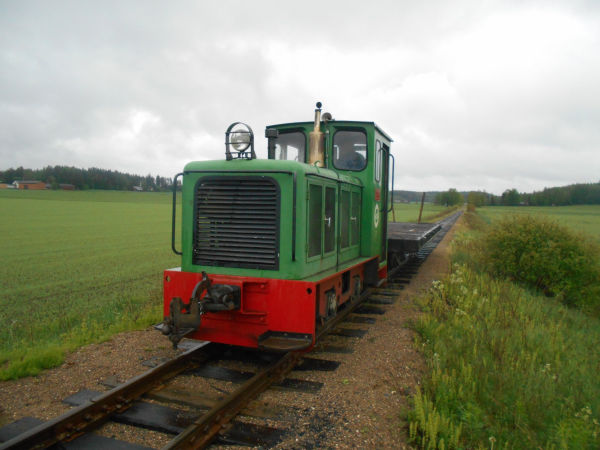
The same Schöma (Schöttler) locomotive as above, here on the line at Santavaihde. Santavaihde is a Finnish word which means point or switch
to a gravel pit.
Picture from Santavaihde at the Jokioinen-Humppila railroad 25.5.2019 by Jyrki Längman.
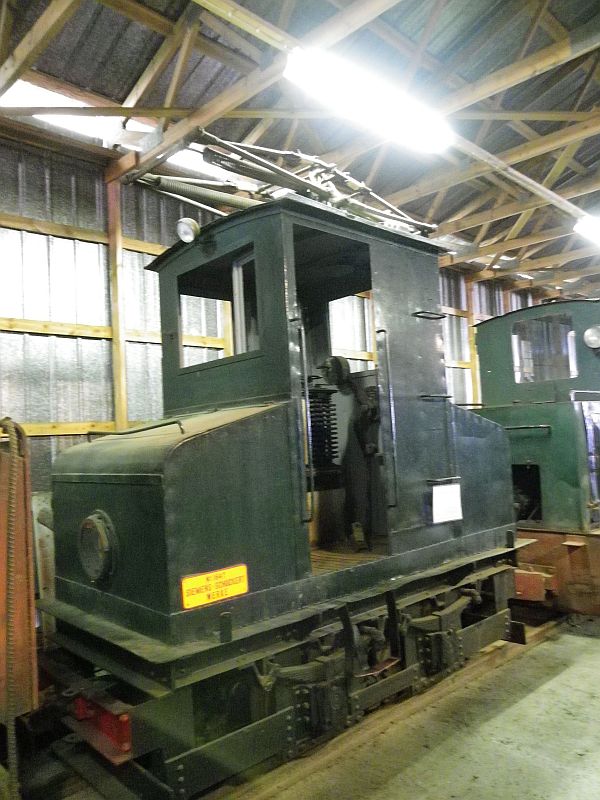
Forssa electric railroad was owned and operated by the cotton mill factories of Forssa Oy, from 1934 Finlayson Oy.
It was a 750 mm gauge 500V DC electric railway inside the town of Forssa linking the factory to the station of the narrow gauge
Jokioinen-Humppila railroad. This Siemens-Schukert built electric locomotive from year 1905 was in use until 1973
when it was damaged by a lightning. The locomotive is now kept at the narrow gauge museum at Minkiö station. Picture 6.6.2010
by Ilkka Siissalo.
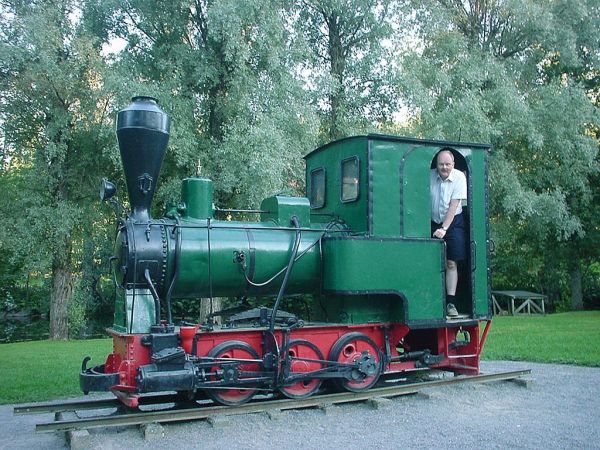
Between 1889 and 1958 there was a 750 mm gauge cargo railroad between the Pohjankuru (Skuru in Swedish) harbour and the Åminnefors
factories in Fiskars. This is the locomotive "Pikku-Pässi" (little ram) of the Fiskars-Pohjankuru railroad. It was built by Krupp in Germany in 1890
and it remained in operation until 1952. It is now kept at Fiskars village as a monument. Photo 19.8.2002 by Mervi Kaleva (now Mervi Salmela).
The person inside the loco is rail photographer Ilkka Siissalo.
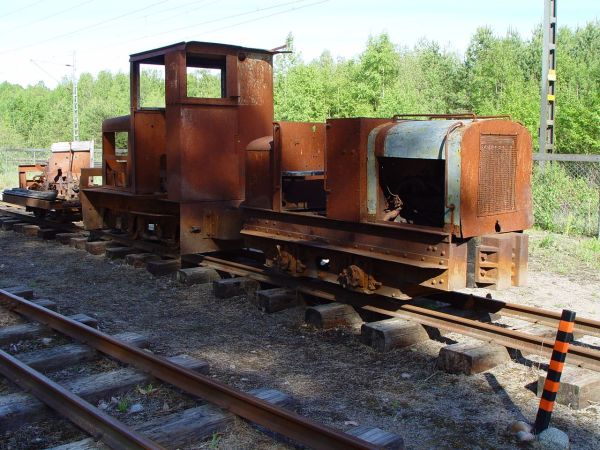
Once upon a time there was also a 750 mm narrow gauge line from Kovjoki station by the main VR broad gauge line to the city of Uusikaarlepyy
(Nykarleby in Swedish). This was called Nykarleby järnväg. These Swedish built locomotives of that railroad are not exactly in a good shape
anymore. Picture at Kovjoki 13.6.2004 by Ilkka Siissalo.
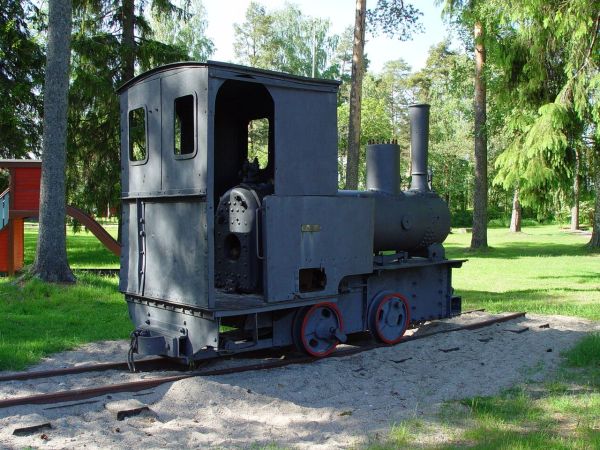
Another Nykarleby-Kovjoki railway locomotive is today at a children's playground in Kovjoki.
Picture at Kovjoki 13.6.2004 by Ilkka Siissalo.
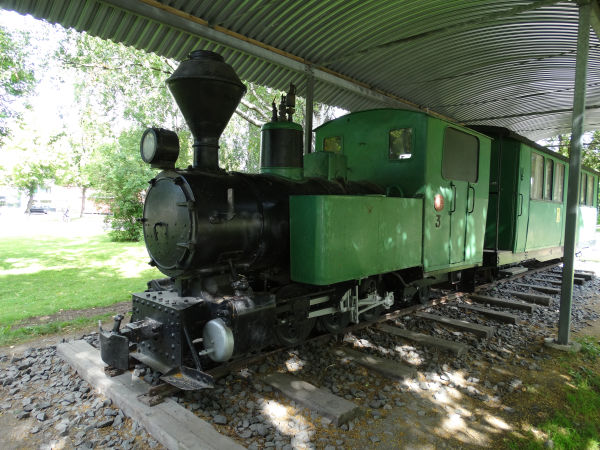
Between 1907 and 1954 there was a narrow gauge railway between the station of Riihimäki and Loppi, connecting the town of Loppi and the
surrounding countryside to the main line railroad at Riihimäki. Nothing is today left of the railway, But the Riihimäki-Loppi Railway RLR
locomotive no.3 and a coach have been set up as a monument near the station of Riihimäki. The locomotive has been built in 1912 in Tampere Finland
in Tammerfors Linné och jernmanufaktur A.B. what later became the company Tampella. The coach has been built at the Sandviken (Hietalahti) shipyard
in Helsinki in 1911. Picture from Riihimäki 5.8.2017 by Ilkka Siissalo.
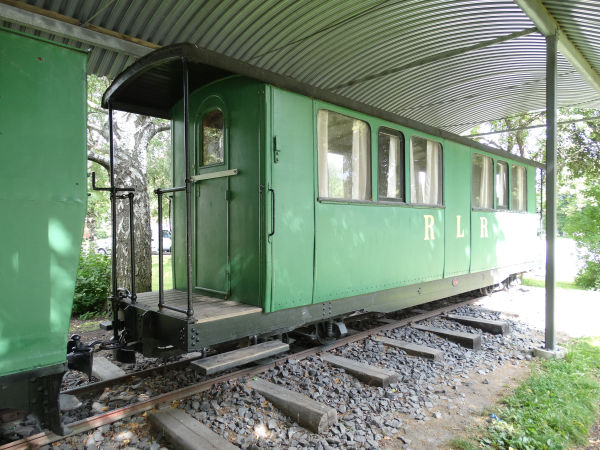
The RLR coach from 1911. Picture from Riihimäki 5.8.2017 by Ilkka Siissalo.

